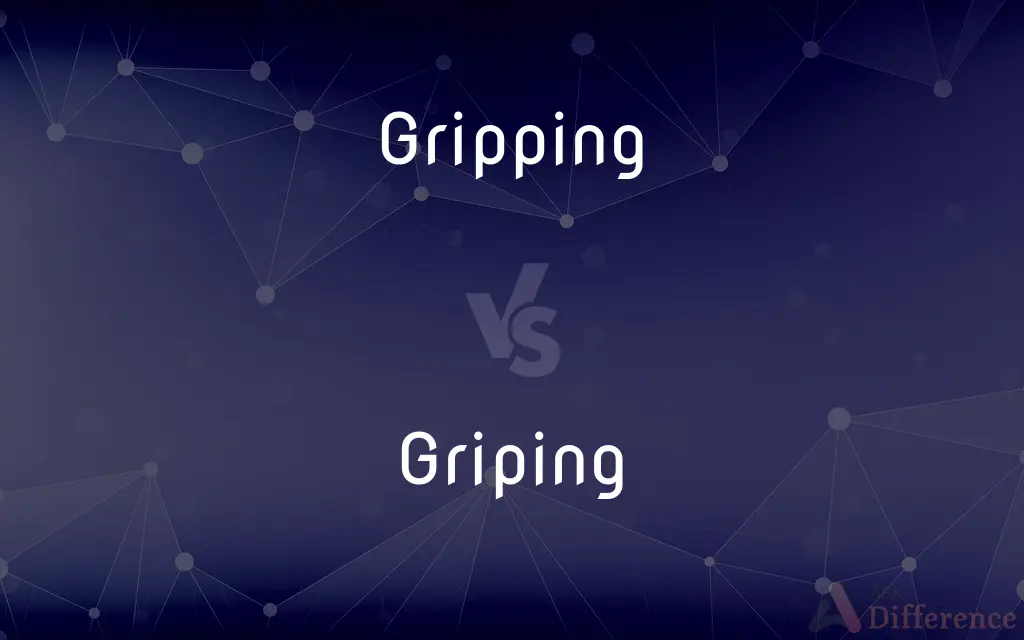Gripping vs. Griping — What's the Difference?
By Tayyaba Rehman & Urooj Arif — Updated on April 16, 2024
Gripping refers to something that captivates or holds attention, while griping involves complaining persistently about trivial matters.

Difference Between Gripping and Griping
Table of Contents
ADVERTISEMENT
Key Differences
Gripping often describes a book, movie, or situation that is so engaging it holds your attention completely, captivating you with its intensity or suspense. On the other hand, griping is the act of expressing dissatisfaction or complaining about something, often repeatedly and annoyingly over minor issues.
In the context of narrative or storytelling, a gripping plot keeps readers or viewers on the edge of their seats, eager to see what happens next. Whereas, griping in conversation or written form can deter the audience’s interest, as it might focus on negative aspects without constructive purpose.
When someone uses the term "gripping" in a review, it generally signals a positive experience, suggesting that the content was compelling and worth the time invested. Conversely, if someone is described as "griping," it typically indicates negativity and might suggest that the person is hard to please or overly critical.
In psychological impact, gripping content can lead to increased engagement and emotional investment from an audience, potentially leaving a lasting impression. In contrast, constant griping can lead to frustration and a negative atmosphere, affecting the mood and morale of those involved.
Marketing strategies might promote a product or event as gripping to attract interest and assure potential customers of its value. On the contrary, addressing customer gripes effectively can also be crucial for maintaining trust and satisfaction, highlighting the importance of responsiveness to feedback.
ADVERTISEMENT
Comparison Chart
Definition
Captivating and holding attention
Complaining persistently about trifles
Connotation
Positive, engaging
Negative, annoying
Typical Usage
Describes stories, events, performances
Refers to expressions of dissatisfaction
Impact on Audience
Engages and entertains
Annoys or drives away
Associated Behaviors
Reading, watching, experiencing actively
Complaining, whining, criticizing
Compare with Definitions
Gripping
Involving an intense or exciting situation.
The movie’s gripping climax left everyone in the theater speechless.
Griping
Making petty complaints.
Griping about the food, she sent her meal back three times.
Gripping
Able to arouse interest or curiosity.
The documentary presented a gripping account of the civil rights movement.
Griping
Grumbling or complaining incessantly.
He kept griping about the weather during our vacation.
Gripping
Holding or seizing firmly.
The climber’s gripping hold on the rope was crucial for safety.
Griping
Expressing dissatisfaction frequently.
She was griping about the office’s new policies.
Gripping
Engrossing to the point of keeping one's attention fixed.
The novel was so gripping that I read it in one sitting.
Griping
Persistently criticizing minor annoyances.
He’s always griping about the daily commute.
Gripping
Demanding full attention by being exciting.
The magician’s gripping performance captivated the entire crowd.
Griping
Voicing trivial objections.
Griping about seating arrangements, he made everyone uncomfortable.
Gripping
A tight hold; a firm grasp
A drowning swimmer now safely in the grip of a lifeguard.
Griping
(Informal) To complain naggingly or petulantly; grumble.
Gripping
The pressure or strength of such a grasp
A wrestler with an unmatched grip.
Griping
To have sharp pains in the bowels.
Gripping
A manner of grasping and holding
The crate afforded no comfortable grip.
Griping
(Informal) To irritate; annoy
Her petty complaints really gripe me.
Gripping
Intellectual hold; understanding
A good grip on French history.
Griping
To cause sharp pain in the bowels of.
Gripping
Ability to function properly or well; competence
Getting a grip on the new technique.
Griping
To grasp; seize.
Gripping
Mental or emotional composure
Lost his grip after he was fired.
Griping
To oppress or afflict.
Gripping
A mechanical device that grasps and holds.
Griping
(Informal) A complaint.
Gripping
A part, such as a handle, that is designed to be grasped and held.
Griping
Gripes Sharp, spasmodic pains in the bowels.
Gripping
A suitcase or valise.
Griping
A firm hold; a grasp.
Gripping
A stagehand who helps in shifting scenery.
Griping
A grip; a handle.
Gripping
A member of a film production crew who adjusts sets, lighting, and props and sometimes assists the camera operator.
Griping
Present participle of gripe
Gripping
To secure and maintain a tight hold on; seize firmly.
Griping
Pinching and spasmodic pain in the intestines; gripe.
Gripping
To hold the interest or attention of
A scene that gripped the entire audience.
Gripping
To maintain a secure grasp.
Gripping
Which catches someone's attention; exciting
A gripping action film
Gripping
Present participle of grip
Gripping
The act of forming a grip.
Gripping
Obsolete form of griping
Gripping
Capable of arousing and holding the attention;
A fascinating story
Common Curiosities
How can one handle a colleague who is always griping?
Handling a colleague who frequently gripes involves listening empathetically, offering constructive solutions where possible, and setting boundaries to avoid negative impacts on morale. Encouraging a positive outlook or redirecting the conversation towards more productive topics can also be effective.
How does one create a gripping narrative in writing?
Creating a gripping narrative involves building a compelling plot with complex characters, suspenseful twists, and high stakes. The writer needs to engage the reader’s emotions and curiosity, making them eager to turn the page to find out what happens next.
What’s the difference between griping and giving constructive criticism?
Griping is persistently complaining about trivial matters without offering solutions, often focusing on minor inconveniences. Constructive criticism, on the other hand, aims to identify problems and propose solutions to improve the situation in a helpful and specific manner.
Are gripping stories always fictional?
No, gripping stories can be both fictional and non-fictional. Non-fictional accounts, such as biographies, documentaries, or historical reports, can also be gripping if they present compelling facts or narratives in an engaging manner.
Can griping ever be justified?
Griping can be justified when it highlights legitimate grievances that need addressing, especially if it leads to awareness and positive changes. However, continuous griping about trivial matters is generally seen as unproductive and negative.
What psychological effects can griping have on a group?
Griping can have negative psychological effects on a group, including lowering morale, fostering negativity, and diminishing productivity. It can create a toxic atmosphere if not addressed constructively.
What defines a movie as gripping?
A movie is defined as gripping if it consistently holds the audience's attention through intense, exciting, or suspenseful elements, compelling them to stay engaged and eager to see what happens next.
What are common subjects of griping in the workplace?
Common subjects of griping in the workplace include workload, management decisions, workplace policies, coworker behavior, and working conditions.
Can a documentary be gripping?
Yes, a documentary can be gripping if it presents its subject matter in a compelling and engaging way, often by including dramatic real-life footage, intriguing facts, or powerful narratives that captivate the audience's interest.
What makes an experience gripping?
An experience is gripping when it thoroughly captivates one's attention and emotions, often through excitement, intrigue, or suspense, making the individual fully immersed and emotionally invested in the outcome.
Why do people tend to gripe about small inconveniences?
People often gripe about small inconveniences as a way to vent frustration from daily stressors or a sense of lack of control over larger aspects of their life. It can also be a habitual way to seek sympathy or attention from others.
Is it common for people to describe a game as gripping?
Yes, it is common for people to describe games, especially video games and board games, as gripping if they involve engaging storylines, challenging gameplay, or competitive elements that keep players intensely involved.
How can teachers make their lessons more gripping?
Teachers can make their lessons more gripping by incorporating interactive elements, real-life applications, multimedia resources, and varying teaching methods to engage different learning styles and keep students actively involved in the learning process.
Is griping more common in certain cultures?
Cultural attitudes towards complaining vary widely; some cultures may view griping as a normal way to express discontent, while others might see it as socially undesirable. Cultural norms heavily influence how acceptable it is to gripe openly.
How can companies address customer gripes effectively?
Companies can address customer gripes effectively by listening actively, responding promptly, acknowledging the issues raised, and offering practical solutions or compensations. Transparency and a customer-focused approach are crucial in maintaining trust and satisfaction.
Share Your Discovery

Previous Comparison
Fetter vs. Shackle
Next Comparison
Dome vs. VaultAuthor Spotlight
Written by
Tayyaba RehmanTayyaba Rehman is a distinguished writer, currently serving as a primary contributor to askdifference.com. As a researcher in semantics and etymology, Tayyaba's passion for the complexity of languages and their distinctions has found a perfect home on the platform. Tayyaba delves into the intricacies of language, distinguishing between commonly confused words and phrases, thereby providing clarity for readers worldwide.
Co-written by
Urooj ArifUrooj is a skilled content writer at Ask Difference, known for her exceptional ability to simplify complex topics into engaging and informative content. With a passion for research and a flair for clear, concise writing, she consistently delivers articles that resonate with our diverse audience.














































